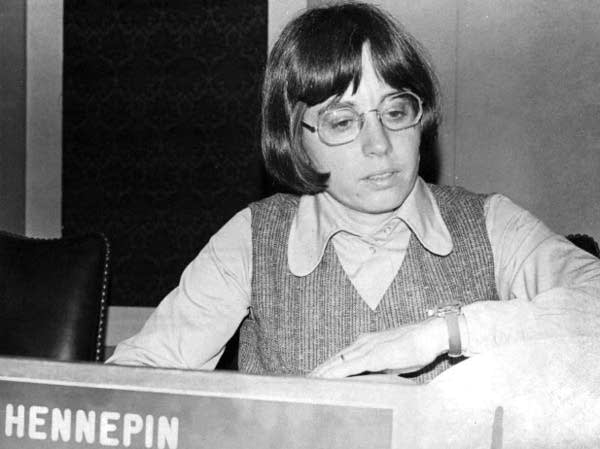Historic transition: Phyllis Kahn soon ends her long legislative career

Go Deeper.
Create an account or log in to save stories.
Like this?
Thanks for liking this story! We have added it to a list of your favorite stories.
One of Minnesota's longest-serving lawmakers is leaving the state legislature. State Rep. Phyllis Kahn, who's represented her Minneapolis district since 1973, finished last in a three-way primary Tuesday.
Replacing her on the general election ballot is Ilhan Omar, who could make history in November as the first Somali-American woman elected to a legislature in the United States. Omar faces another Somali American, Abdimalik Askar, a Republican, in November.

Minnesota voters sent the first women to the state Legislature back in 1922. But for much of the next half century, they were woefully under-represented.
By 1972 there was just one woman serving in the Minnesota House and Senate.
Turn Up Your Support
MPR News helps you turn down the noise and build shared understanding. Turn up your support for this public resource and keep trusted journalism accessible to all.
But that year a major grassroots effort called the Minnesota Women's Political Caucus would celebrate a big victory — the election of five more women, two conservatives and three DFLers — to the state House.

The newcomers included Phyllis Kahn and Joan Growe of Minnetonka, who would later go on to win statewide office as secretary of state.
"It was historic when we were elected. That was the headline in the newspaper in 1972: the women are taking over. And we looked at it and we were stunned, because there were a total of six of us. And we thought, how can we take over we don't even know each other?"
The Minnesota House was still very much a boy's club. But in a 1973 interview, Kahn told MPR she and the other women won the respect of their male colleagues.
"I think we've found that we are for the most part treated seriously. We're given good assignments, we're listened to to some extent, as much as anyone else is when we get up to speak," the new legislator said. "And we've found it's a very pleasant place to be."
Kahn made her mark quickly. At a time when lighting up a cigarette at the office was just as socially acceptable as sipping a cup of coffee, she sponsored Minnesota's Clean Indoor Air Act. In 1975, Kahn, a Ph.D. biophysicist, cited research showing the health effects of secondhand smoke.
"Children brought up by smoking parents are far more prone to respiratory disease and asthmatic attacks. We're only seeking by this bill to establish the right to breathe clean air as a fundamental public right," she said.
The measure passed. It became the first state law in the nation to restrict smoking in public places.
University of Minnesota political science professor Larry Jacobs says Kahn was a trailblazer in a variety of other areas too — from promoting bicycles as a mode of transportation to consolidating the state's information technology services.
"Here you had a liberal, who's been consistently thinking about how government can perform better, suspicious that there was too much waste and inefficiency in the government," Jacobs said.
Kahn also authored a number of bills that had little effect beyond raising Minnesotans' eyebrows: the short list includes allowing 12-year-olds to vote, repealing the ban on first-cousin marriage and making some photography from drones a felony.
There was also an incident of old fashioned dirty tricks. A dozen years ago she pleaded guilty to misdemeanor theft for stealing a Republican's campaign literature from several homes in New Hope. A judge fined her $200.
A redrawing of the legislative map eventually put a large number of people fleeing Somalia's civil war beginning in the 1990s into Kahn's district. Jacobs said Kahn did not ignore this part of her constituency. But the growing clout of Somali-American voters raised an obvious question.
"Which was, why weren't Somalis being represented by a Somali? Phyllis had very strong responses in terms of what she'd done for the Somali community, but she never had or could have a response to the fact that she was a white woman," said Jacobs.
Two years ago, Kahn survived a primary challenge from former Minneapolis school board member Mohamud Noor. In Tuesday's primary, she and Noor each garnered 29 percent of the vote. But political newcomer Ilhan Omar was the runaway favorite — not only with Somali-Americans but also with the broader community.
On Tuesday night, Kahn wished Omar the best in blazing her own path.
"I was elected in '72. It was an historic event. This is a new historic event. Obviously our district is the home of historic events," Kahn said.
Kahn says she's most proud of her environmental legislation and the millions she saved taxpayers by consolidating IT services.
She was also quick to point out the lack of cigarette smoke in the Minneapolis bar where she made her first concession speech in 44 years.


